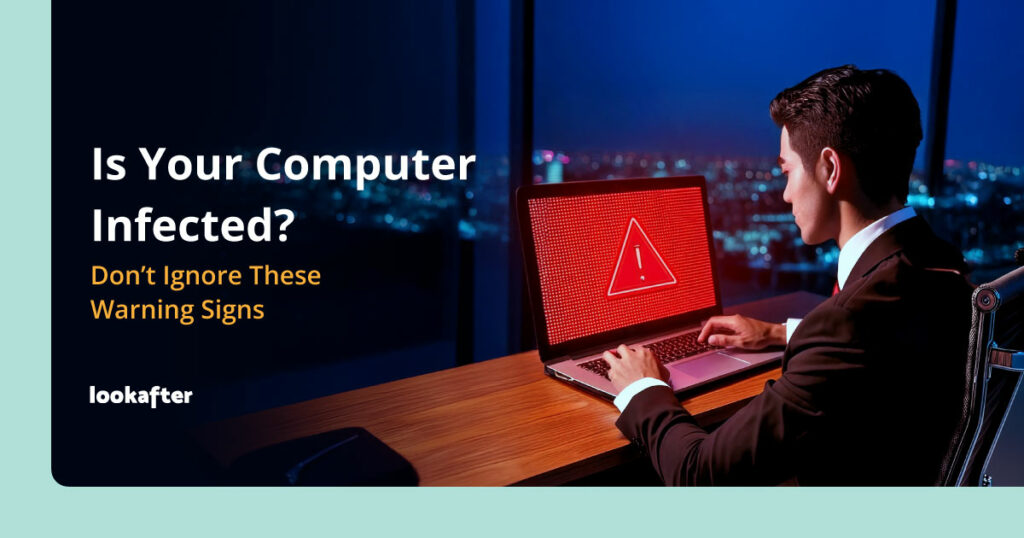Home > Empowering Tips > Is Your Computer Infected? Don’t Ignore These Warning Signs

A computer infection, often caused by viruses, malware, or spyware, can significantly compromise your system’s performance and security. Recognizing these warning signs can help you take timely action to protect your data and prevent further damage.
Common Warning Signs of a Computer Infection
1. Slow Performance
One of the most noticeable signs of infection is a sudden decrease in your computer’s speed. If your system takes longer than usual to boot, programs are slow to load, or there’s frequent lag, malware could be using your computer’s resources without your knowledge.
2. Frequent Crashes or Freezes
If your computer is regularly crashing, freezing, or rebooting without warning, this could indicate that malware has corrupted essential system files. Persistent error messages, particularly “Blue Screen of Death” (BSOD) on Windows systems, might also be a sign.
3. Unwanted Pop-ups and Ads
Excessive pop-ups, especially those that appear without your consent or are difficult to close, are often indicators of malware. These pop-ups can contain malicious links or downloads.
4. Unfamiliar Programs Installed
If you notice programs or toolbars you didn’t install, or if your browser homepage and search engine have changed without your consent, malware could be at play. This is often the result of bundled software or PUPs (Potentially Unwanted Programs) sneaking into your system.
5. Unexplained Disk Activity
Malware often performs tasks in the background, leading to continuous hard drive activity, even when you aren’t using your computer. If you hear your hard drive working overtime or notice your storage space filling up unexpectedly, it’s worth investigating further.
6. Data Corruption or Loss
Malware can corrupt or delete your files, leading to data loss. If you notice missing or corrupted files, it’s a red flag for a potential infection.
7. Suspicious Emails or Messages
If your contacts report receiving strange emails from your account, especially ones with attachments or suspicious links, your computer or email account may have been compromised by malware.
8. Disabled Security Software
Malware often targets antivirus programs or firewalls, disabling or corrupting them to prevent detection. If your security software stops working, can’t be updated, or simply disappears, it’s time to act quickly.
9. Unusual Network Activity
Pay attention to unusual network activity, such as high data usage or slow internet speeds. Malware can use your internet connection to communicate with remote servers, potentially compromising your privacy and security.
10. Strange Behaviour
Malware can cause random behaviour, such as programs opening or closing on their own, mouse cursor moving on its own, or changes to system settings without your input. These anomalies are a clear indication that your system needs attention.
What to Do if Your Computer Is Infected
If you notice any of these warning signs, take immediate action to protect your computer. Here are some steps you can follow:
- Disconnect from the internet: This will prevent the malware from spreading or communicating with external servers.
- Scan your computer with antivirus software: Use a reputable antivirus program to scan your computer for malware and remove any detected threats.
- Remove suspicious programs: Uninstall any unfamiliar or unwanted programs from your system.
- Update your operating system and software: Ensure that your operating system and software are up-to-date with the latest security patches.
- Backup important data: Regularly back up your important data to an external hard drive or cloud storage to protect it from potential loss.
FAQs About Computer Infections
1. What is a computer infection?
A computer infection refers to malicious software (malware) that infiltrates a computer system. This malware can range from viruses, worms, ransomware, to spyware, which can cause harm by corrupting files, stealing data, or disrupting normal operations.
2. How do computers get infected?
Computers can get infected in various ways, including downloading infected files, clicking on malicious links or email attachments, visiting compromised websites, and connecting to infected USB drives. Even seemingly legitimate software may come bundled with malware.
3. Can my computer get infected with just browsing the internet?
Yes, computers can get infected by simply visiting malicious websites, especially if your system has outdated software or lacks security patches. Some sites host “drive-by downloads” that automatically install malware without your knowledge.
4. How can I prevent my computer from getting infected?
You can prevent infections by:
- Using reputable antivirus software.
- Keeping your operating system and applications up to date.
- Avoiding suspicious links and email attachments.
- Only downloading software from trusted sources.
- Enabling firewalls and practicing safe browsing habits.
- Use strong, unique passwords for your online accounts.
5. What should I do if my email account is sending spam?
If your email account is sending spam, it may be compromised. Immediately change your email password, enable two-factor authentication, and scan your computer for malware. Notify your contacts to avoid clicking on any suspicious links sent from your account.
6. Can a computer infection damage hardware?
While most malware targets software and data, some types, like malware that manipulates hardware settings (such as cooling fans or power management), can indirectly cause hardware damage. However, direct physical harm to hardware from malware is rare.
7. Can a computer infection spread to other devices on my network?
Yes, certain malware, such as worms and network viruses, can spread to other devices connected to the same network. If one device is infected, it may attempt to infect others through shared files, network vulnerabilities, or weak security.
8. Can I remove a computer infection myself?
In many cases, yes. Running a full scan with reliable antivirus or anti-malware software can detect and remove most infections. However, for more complex or deeply rooted infections like ransomware, you may need professional assistance or specialized tools.